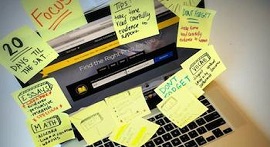Founded in 1850, the University of Rochester is located in Western New York. Rochester's rich history in enterprise and social justice radiate through the student experience through courses and extracurricular activities. The moderate size and range of academic and top-tier research programs allow for both individual attention and unique flexibility in designing undergraduate studies. Rochester's unique undergraduate curriculum lets our students take control of their education from day one. Students pursue and connect a wide range of interests— from math to music to modern dance.
Rochester operates as both a homebase and launchpad for discovery. Our students and faculty come from around the world, so diverse perspectives characterize all aspects of life on campus.
The University's mission is to Learn, Discover, Heal, Create—and Make the World Ever Better. Through individual endeavors and collaborative efforts, students and faculty work toward this goal each day, improving themselves, each other, and their shared learning environment in the process. The University's motto, "Meliora" (ever better), shapes students into future leaders in industry, education, and culture.
About
From the School
Contact & Visit
Campus Visits Contact
Admissions Guest Services Assistant Director
PO Box 270251
Rochester, NY 14627
Experience College Life
Engineering Quad
Rush Rhees Library
Interfaith Chapel
Robert B. Goergen Athletic Center
Memorial Art Gallery
Rochester Museum and Science Center
Susan B. Anthony House
Park Avenue Neighborhood
The Strong
Campus Tours
8:30am-5:00pm
585-275-3221
Dates: Varies
Times: Varies
Average Length: 1 hour
On Campus Interview
Faculty and Coach Visits
Class Visits
Overnight Dorm Stays
Transportation
Admissions
Admissions
Overall
From The School
We invite you—the curious, the capable, and the engaged—to apply to our diverse and talented community of doers and disrupters. We strive to admit students who'll work to make each other, the University, and the world ever better.
Admission to the College of Arts, Sciences and Engineering is based on a holistic review process that includes a test-optional philosophy. We consider all elements of a prospective student's application, including their academic achievement, extracurricular engagement, ethical character, and alignment with Rochester's mission and values.
The Regular Decision and Early Decision II application deadline for first-year fall admission is January 5. The Early Decision I application deadline is November 1. The University accepts the Common Application and the Coalition for College Application.
The University accepts transfer applications for fall and spring semester on a rolling basis. The recommended deadline for priority consideration is March 15 for students applying for fall semester and October 15 for spring.
Overview
SAT & ACT Test Scores
Testing Policies
Deadlines
Early Decision — November 1
Early Decision II — January 5
Regular — January 5
Other Admission Factors
Rigor of Secondary School Record
Academic GPA
Application Essay
Extracurricular Activities
Character / Personal Qualities
Selectivity Rating
Get a personalized plan for a competitive application from an admissions expert.
Learn MoreAcademics
Academics
Overall
From The School
Academic Programs
The University of Rochester's unique undergraduate curriculum lets our students take control of their education from day one. With no general education requirements and no traditional "core" curriculum, students get to curate their own program of study. Our flexible curriculum allows students to delve into existing academic interests while affording plenty of time to explore new passions. 45% of undergraduate students graduate with double majors.
Learn more about the Rochester Curriculum: https://admissions.rochester.edu/academics/rochester-curriculum/
Beyond traditional coursework, Rochester offers additional opportunities for students to study their individual interests through our Combined Degree Programs, Dual Degree Programs, Research & Innovation Grants, Take Five Scholars Program, e5 Program, study abroad, private lessons at the Eastman School of Music, and undergraduate research.
Majors and Degrees Offered
The University of Rochester offers Bachelor of Arts and/or Bachelor of Science programs through the College. Available majors include: African and African-American studies; American Sign Language; American Studies; Anthropology; Applied Mathematics; Archaeology, Technology & Historical Structures; Art History; Bioethics; Biological Sciences (Biology, Biochemistry, Cell & Developmental Biology, Computational Biology; Ecology & Evolutionary Biology, Microbiology, Molecular Genetics, or Neuroscience); Biomedical Signals & Imaging; Brain & Cognitive Sciences; British & American Literature; Business (Accounting; Business Analytics, Entrepreneurship, Finance; Marketing); Chemistry; Classics; Comparative Literature; Creative Expression & Performance; Creative Writing; Dance Studies; Data Science; Digital Media Studies; East Asian Studies; Economics; English; Environmental Health; Environmental Science; Environmental Studies; Epidemiology; Film & Media Studies; Financial Economics; French; Gender, Sexuality & Women's Studies; Geological Sciences; Geomechanics; German; Health Policy; Health, Behavior & Society; History; Interdepartmental Studies; International Relations; Japanese; Language, Media & Communications; Linguistics; Mathematics; Mathematics & Statistics; Music; Philosophy; Physics; Physics & Astronomy; Political Science; Psychology; Religion; Russian; Russian Studies; Spanish; Statistics; Studio Arts; and Theater.
The Hajim School of Engineering and Applied Sciences offers study in Audio & Music Engineering; Biomedical Engineering; Chemical Engineering; Computer Science; Electrical & Computer Engineering; Engineering Science; Interdepartmental Engineering; Mechanical Engineering; Optical Engineering; and Optics.
Rochester not only offers a Bachelor of Arts in music through the College, but also a Bachelor of Music degree through the Eastman School of Music; available majors include Applied Music, Jazz Studies & Contemporary Media, Music Composition, Music Education, and Music Theory. Private instruction through the Eastman School is available to students in the College.
The College offers certificate programs in Actuarial Studies, Biotechnology, Literary Translation Studies, Mathematical Modeling in Political Science and Economics, and Stage Management. These programs complement traditional majors.
Faculty and Class Information
Graduation Rates
Majors
-
AREA, ETHNIC, CULTURAL, GENDER, AND GROUP STUDIES.
African-American/Black Studies.
American/United States Studies/Civilization.
East Asian Studies.
Russian Studies.
Women's Studies.
-
BIOLOGICAL AND BIOMEDICAL SCIENCES.
Biochemistry.
Biology/Biological Sciences, General.
Cell/Cellular and Molecular Biology.
Epidemiology.
Evolutionary Biology.
Genetics, General.
Microbiology, General.
Neuroscience.
-
BUSINESS, MANAGEMENT, MARKETING, AND RELATED SUPPORT SERVICES.
Accounting.
Business Statistics.
Business/Commerce, General.
Entrepreneurship/Entrepreneurial Studies.
Finance, General.
Marketing.
-
COMMUNICATION, JOURNALISM, AND RELATED PROGRAMS.
Communication and Media Studies.
Digital Communication and Media/Multimedia.
-
COMPUTER AND INFORMATION SCIENCES AND SUPPORT SERVICES.
Computer Science.
-
ENGINEERING.
Bioengineering and Biomedical Engineering.
Chemical Engineering.
Electrical and Electronics Engineering
Engineering Science.
Engineering, Other.
Geological/Geophysical Engineering.
Laser and Optical Engineering.
Mechanical Engineering.
-
ENGLISH LANGUAGE AND LITERATURE/LETTERS.
Creative Writing.
English Language and Literature, General.
-
FOREIGN LANGUAGES, LITERATURES, AND LINGUISTICS.
American Sign Language (ASL).
Classics and Classical Languages, Literatures, and Linguistics, General.
Comparative Literature.
French Language and Literature.
German Language and Literature.
Italian Language and Literature.
Japanese Language and Literature.
Linguistics.
Russian Language and Literature.
Spanish Language and Literature.
-
HEALTH PROFESSIONS AND RELATED PROGRAMS.
Bioethics/Medical Ethics.
Environmental Health.
Public Health, General.
-
HISTORY.
History, General.
-
MATHEMATICS AND STATISTICS.
Applied Mathematics, General.
Mathematics and Statistics, Other.
Mathematics, General.
Statistics, General.
-
MULTI/INTERDISCIPLINARY STUDIES.
Cognitive Science.
Computational Science.
-
NATURAL RESOURCES AND CONSERVATION.
Environmental Science.
Environmental Studies.
-
PHILOSOPHY AND RELIGIOUS STUDIES.
Philosophy.
Religion/Religious Studies.
-
PHYSICAL SCIENCES.
Astronomy.
Chemistry, General.
Geology/Earth Science, General.
Optics/Optical Sciences.
Physics, General.
Physics, Other.
-
PSYCHOLOGY.
Psychology, General.
-
PUBLIC ADMINISTRATION AND SOCIAL SERVICE PROFESSIONS.
Health Policy Analysis.
-
SOCIAL SCIENCES.
Anthropology.
Econometrics and Quantitative Economics.
Economics, General.
International Relations and Affairs.
Political Science and Government, General.
Social Sciences, Other.
-
VISUAL AND PERFORMING ARTS.
Art History, Criticism and Conservation.
Dance, General.
Film/Cinema/Video Studies.
Fine/Studio Arts, General.
Music, General.
Theatre/Theatre Arts Management.
Visual and Performing Arts, Other.
Students Say
Degrees
Certificate
Doctoral
Doctoral/Professional
Doctoral/Research
Master's
Post-Bachelor's certificate
Post-Master's certificate
Career Services
Alumni Network
Alumni Services
Classes
Interest Inventory
Internships
Regional Alumni
Coop
Experiential
Internship
Notable Faculty
Prominent Alumni
Academic Rating
Careers
Graduation Rates
Career Services
Alumni Network
Alumni Services
Classes
Interest Inventory
Internships
Regional Alumni
Coop
Experiential
Internship
ROI & Outcomes
Students Say
Tuition & Aid
Tuition & Aid
Overview
From The School
Tuition, Room, Board and Fees
The estimated cost of attendance for the 2023-24 academic year is $63,150 for tuition and fees; $18,784 for room and board; and $3,862 for books, supplies, and other expenses.
Financial Aid
Academic merit scholarships, loans, grants, tuition payment plans, and part-time jobs all contribute to the University of Rochester's strong financial assistance program. Those applying for financial aid should submit both the Free Application for Federal Student Aid (FAFSA) and the College Scholarship Service (CSS) Profile application.
Merit scholarships are awarded to eligible incoming undergraduate students. Candidates are considered based upon their application for admissions, reviewing academic performance, involvement, and leadership. Although separate applications are not required, students should be aware of earlier deadlines that may apply. Merit scholarships are awarded regardless of financial need. Information on specific scholarship programs is available at https://www.rochester.edu/financial-aid/scholarships/.
Dates
Required Forms
Forms CSSProfile
Forms Divorced Parent
State Aid
Financial Aid Statistics
Expenses per Academic Year
Available Aid
Need-Based College/University Scholarship or Grant Aid from Institutional Funds
Need-Based Federal Pell
Need-Based Private Scholarships
Need-Based SEOG
Need-Based State Scholarships
Direct Subsidized Stafford Loans
Direct Unsubsidized Stafford Loans
Financial Aid Rating
Student Body
Student Body
Overall
From The School
Rochester offers more than 250 student-run clubs, an extensive athletic center, and nightly events; the University of Rochester's River Campus rarely slows down. Most students love it so much that they decide to live on campus all four years.
With student organizations ranging from cultural and political to religious and athletic, students at Rochester can easily find communities of friends who share their interests and passions. Part of what makes the student experience so fun is the variety of rich traditions on campus. This includes Meliora Weekend for students and alumni, Dandelion Day and Springfest, the annual medieval-style celebration Boar's Head Dinner, and Wilson Day community service during first-year Orientation.
Student Body Profile
Demographics
Students Say
Campus Life
Campus Life
Overview
From The School
Location
Known by many names the Flower City, the ROC, the 5-8-5 Rochester is located in Western New York. We're closer to Toronto than to New York City, although both are within driving distance. From our historic museums to our internationally recognized festivals, Rochester has the big-city culture with the small-town charm.
Roughly two miles from downtown along the Genesee River, the University of Rochester's 154-acre River Campus the University's main academic campus is home to roughly 6,500 undergraduate and 5,200 graduate students. The Eastman Quadrangle or the "Quad" is the centerpiece of campus, filled with students in hammocks, games of frisbee, and groups studying under the trees.
The Medical Center and South Campus are within walking distance from the River Campus, and the Eastman School of Music and Memorial Art Gallery are a free 10-minute bus ride away.
Explore more of campus at admissions.rochester.edu/visit/virtual-visit
Campus Facilities & Equipment
The First-Year Quad is home to Gilbert, Hoeing, Lovejoy, and Tiernan Halls which follow traditional corridor-style housing. There are many additional options for upperclassmen including traditional-style rooms, suites, and apartments on campus. Most students chose to live on campus for all four years of their college experience. Students can enjoy a wide range of dining options right on campus including two dining centers, easy grab-and-go stations, and coffee shops.
The River Campus offers an impressive variety of resources and student organizations such as the Frederick Douglass Institute for African-American Studies, the Susan B. Anthony Institute for Gender and Women's Studies, the Institute of Optics, Humanities Center, Goergen Institute for Data Science, M.K. Gandhi Institute for Nonviolence, Institute for the Performing Arts, a virtual reality lab, observatory, iZone a creative problem-solving space designed to empower students to explore and imagine ideas, and an 11-000 square-foot athletic center.
On South Campus, in the Laboratory for Laser Energetics, you will find the 60-beam OMEGA laser, the world's most powerful fusion laser. Highlights at the Medical Center include Strong Memorial Hospital, the James P. Wilmont Cancer Center, and the Golisano Children's Hospital. If you venture into downtown you can find the Memorial Art Gallery and Eastman Theatre, both of which offer free entertainment for University of Rochester students.
Off-Campus Opportunities
The City of Rochester is home to a dynamic mix of culture, commerce, and history. Rated among the most livable cities in the United States, there is an abundance of cultural and recreational opportunities available for our students including free admission to local museums, discounted concert tickets at local music and theater venues, professional sports teams, proximity to local parks, and ample ways to engage with Rochester's rich history. With Lake Ontario to the north and the scenic Finger Lakes to the south, there are also plenty of opportunities for students to engage with nature.
Campus Life
Housing Options
Apartment Single
Disabled Student
Dorms Coed
Dorms Male
Frat Sorority
Theme Housing
Students Say
Special Needs Admissions
Special Need Services Offered
Student Activities
Sports
Basketball
Cross Country
Diving
Football
Golf
Soccer
Squash
Swimming
Tennis
Track Field Indoor
Track Field Outdoor
Crew Rowing
Cricket
Cycling
Diving
Field Hockey
Lacrosse
Soccer
Softball
Swimming
Tennis
Track Field Indoor
Track Field Outdoor
Volleyball
Student Services
Womens Center
LGBT Support Groups
Minority Support Groups
Army ROTC Offered at cooperating institutions: Rochester Institute of Technology
Navy ROTC Offered on-campus
Air Force ROTC Offered at cooperating institutions: Rochester Institute of Technology
Sustainability
Data provided by Association for the Advancement of Sustainability in Higher Education (AASHE), STARS®, as of March, 2024.
Campus Security Report
The Jeanne Clery Act requires colleges and universities to disclose their security policies, keep a public crime log, publish an annual crime report and provide timely warnings to students and campus employees about a crime posing an immediate or ongoing threat to students and campus employees.
Please visit The Princeton Review’s page on campus safety for additional resources: http://www.princetonreview.com/safety
The Princeton Review publishes links directly to each school's Campus Security Reports where available. Applicants can also access all school-specific campus safety information using the Campus Safety and Security Data Analysis Cutting Tool provided by the Office of Postsecondary Education of the U.S. Department of Education: https://ope.ed.gov/campussafety/#/
Other Information
Wellness Program/Clinical Offerings
Education & Training
Available for faculty & staff;



















